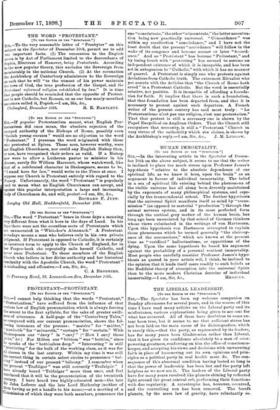PROTESTANT—PROTESTANT.
Ere TIM EDITOR OP THE " 13PROTATOR:9 Sta,—I cannot help thinking that the words "Protestant," `Protestantism," have suffered from the influence of that curious law of English pronunciation which is always forcing the accent to the first syllable, for the sake of greater swift- ness of utterance. A half-page of the " Canterbury Tales," as compared with our current pronunciation, shows the fol- lowing instances of the process : " matere" for "matter," `maniseth" for " menaceth," "certayn" for "certain." With Shakespeare our " envy " is " env f " ("How I envf those jacks," &c.) For Milton our "bottom" was " bett6m," since be speaks of the " bottomless deep." "Interesting" is still *Interesting" for the balk of the working class, as it was for an classes in the last century. Within my time it was still the correct thing in certain. nelect circles to pronounce " bal- e*" instead of our present " balcony." I remember when Our present " Trafalgar " was still correctly "Trafalgar." I have already heard " Trafalgar " more than once, and feel °writ:teed that it will be the pronunciation of the twentieth century. I have heard two highly-educated men—the late Sir john Lefevre and the late Lord Hatherley (neither of hem having as yet a handle to his name)—at a meeting of a Compassion of which they were both members, pronounce the one "concentrate," the other "concentrate," the latter accentua- tion being now practically universal. " Concordance " was within my recollection " concordance," and I have not the least doubt that the present" accordance " will follow in the wake of its congener and become sooner or later "accord- ance." And so " Protestant " has become "Protestant," and by losing touch with " protesting " has seemed to assume an independent existence of which it is incapable, and has been set in antagonism to "'Catholic," with which it has no manner of quarrel. A Protestant is simply one who protests against 'deviations from Catholic truth. The extremest Ritualist who yet asserts with the Articles that "the Church of Rome hath erred" is a Protestant Catholic. But the word is essentially relative, not positive. It is incapable of affording a founda- tion for faith. It implies that there is such a foundation, that that foundation has been departed from,. and that it is. 'necessary to protest against such departure. A French writer of the present century has said most truly : " Le 'Protestantisme n'est pas une religion, &est une protestation? That that protest is still a necessary one is shown by the Papal Encyclical on Anglican Orders. That the Church still recognises that necessity, is still a " Protestant " Church in very virtue of the catholicity which she claims, is shown by
the Archbishop's reply.—I am, Sir, &c., J. M. LUDLOW.










































 Previous page
Previous page